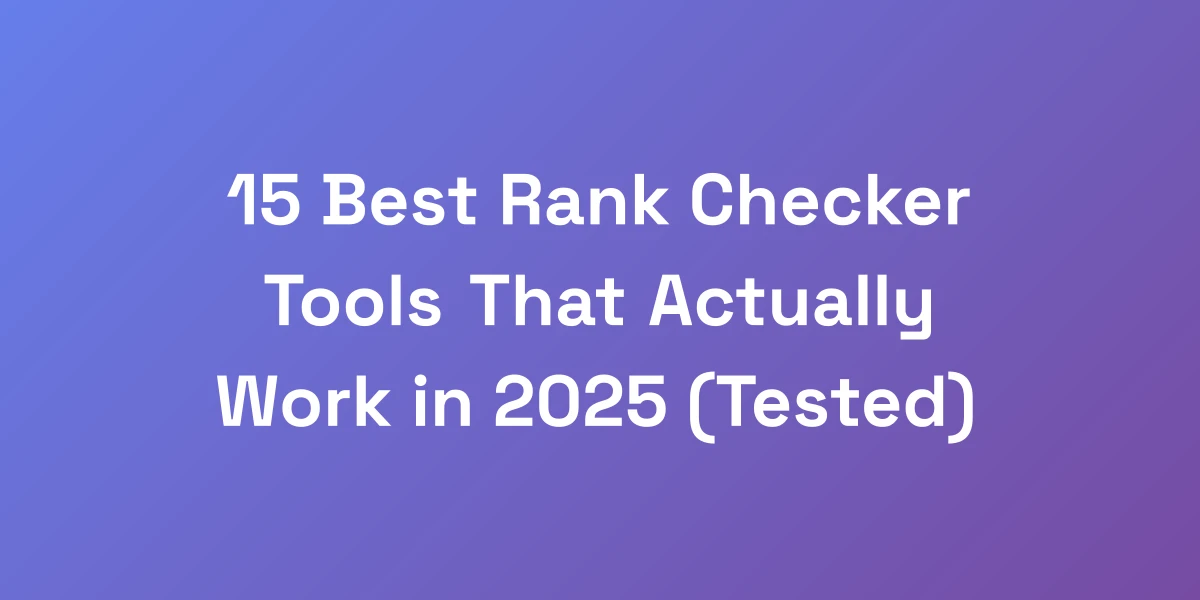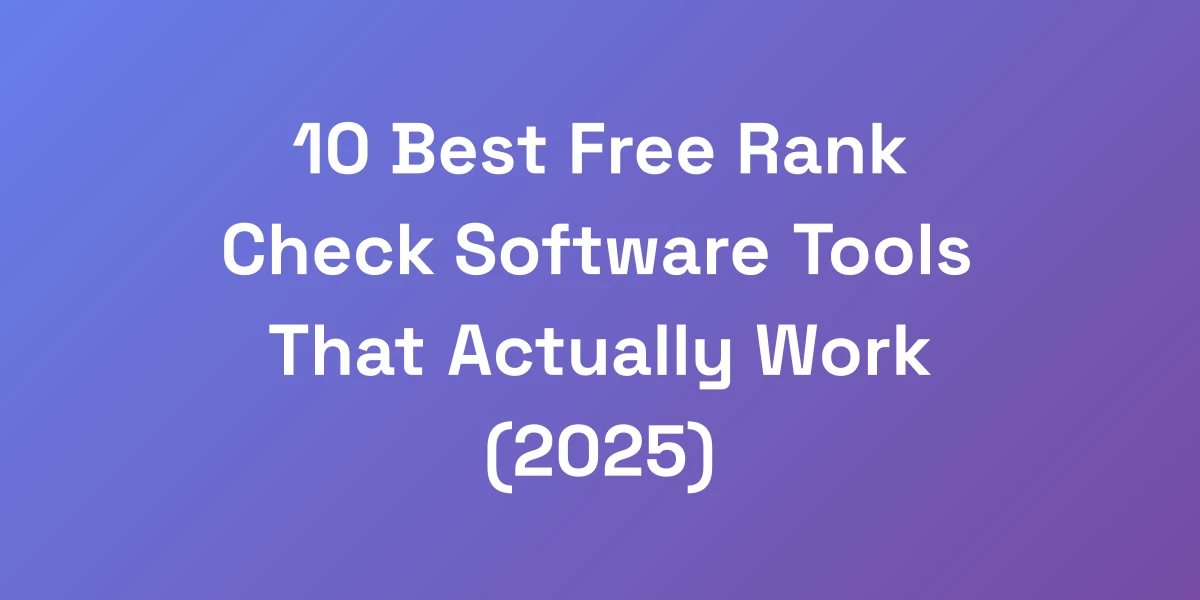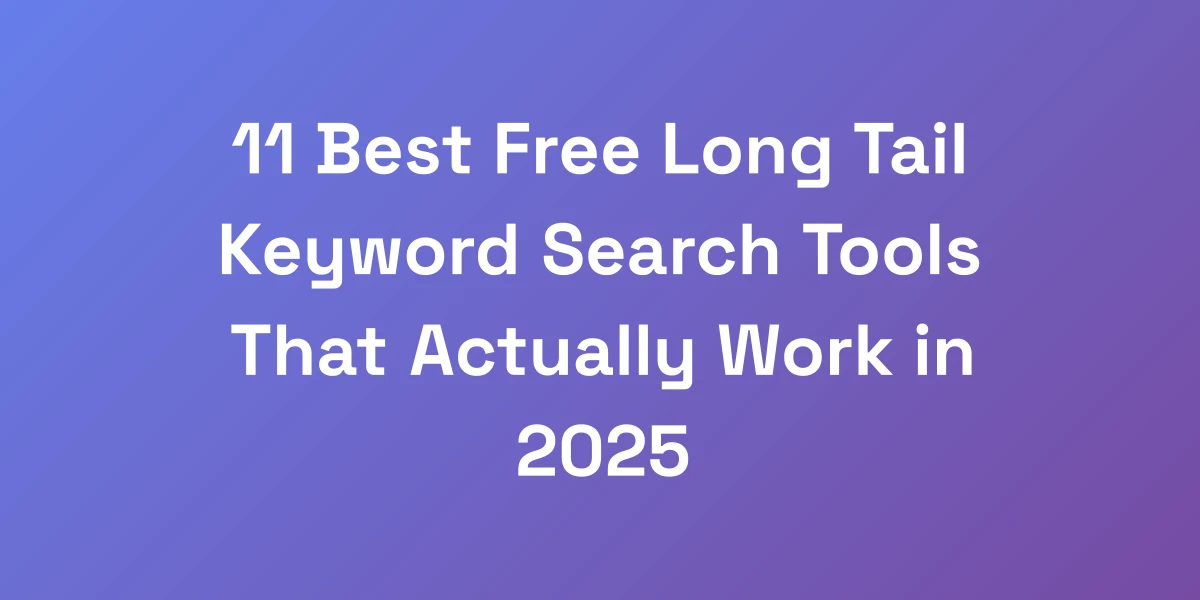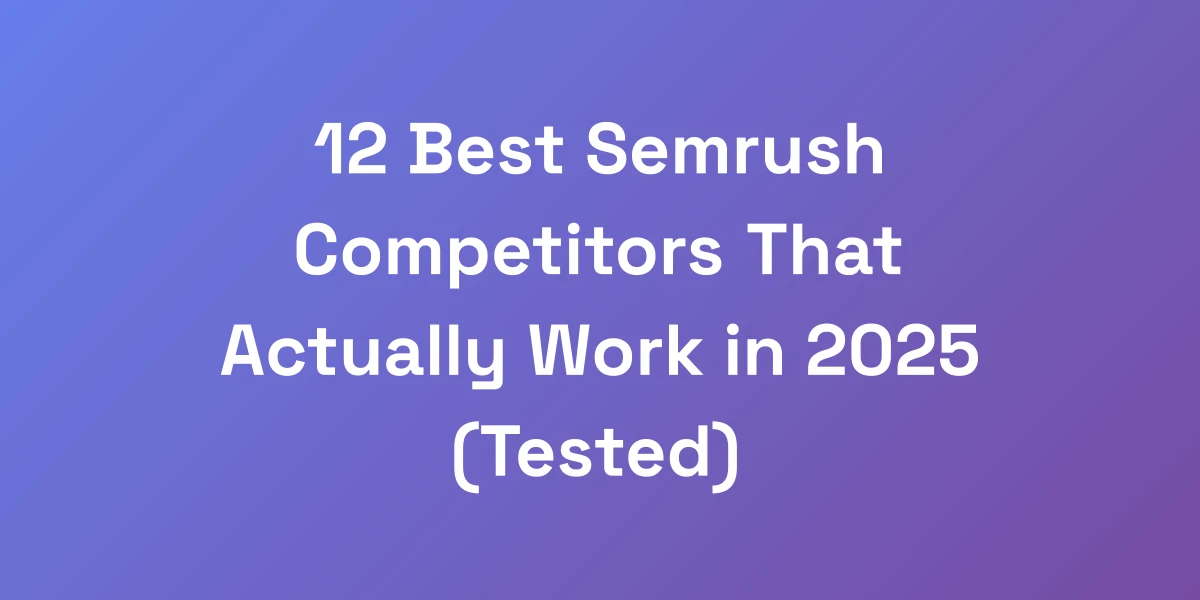7 Best Keyword Rank Trackers That Actually Work in 2025
Apr 9, 2025 | By [email protected]
7 Best Keyword Rank Trackers That Actually Work in 2025
Ever feel like you’re throwing darts blindfolded when it comes to SEO? You’re not alone.
The struggle is real. You’ve invested time, money, and resources into your SEO strategy, but without a reliable keyword rank tracker, how do you know if it’s actually working? Check out this comprehensive list of rank tracker tools to find the one that suits your needs.
Most tools promise the moon but deliver sand. It’s frustrating, right? Let’s cut through the noise and get real about what works in 2025.
We’re diving deep into the top keyword rank trackers that don’t just talk the talk but walk the walk.
If you’re ready to stop guessing and start dominating search results, keep reading.
Why Most SEO Tools Are Lying About Your Rankings
Let me hit you with some truth: 90% of rank tracking tools out there are feeding you BS data.
I’ve spent millions on SEO, and here’s what nobody tells you – the accuracy of your rank tracker can make or break your entire SEO strategy.
Most tools update weekly (useless), pull from cached data (garbage), or worse, use proxies that Google’s already blocked.
If you’re serious about dominating search results, you need real-time, accurate data that you can actually trust.
Here’s what separates the winners from the wannabes.
The Hidden Cost of Inaccurate Rank Tracking
Imagine pouring resources into SEO efforts that aren’t even moving the needle. That’s what inaccurate rank tracking does.
It leads to misinformed strategies, wasted budget, and lost opportunities.
For instance, if your rank tracker shows you’re ranking higher than you actually are, you might slack off on optimization, only to watch competitors overtake you.
That’s money lost, time wasted, and potential customers slipping through the cracks.
Inaccurate data isn’t just a minor annoyance—it’s a silent killer of your SEO efforts.
Why Traditional Rank Trackers Fail
Traditional rank trackers often rely on outdated methods that just don’t cut it anymore.
They update infrequently, if at all, lagging behind real-time changes in the SERPs.
Imagine trying to navigate with a map that’s last updated last year. That’s your current rank tracker.
Moreover, many use IP proxies that have been flagged by Google, leading to skewed results or even temporary bans from tracking.
This means the data you do get might be tampered with, making it even harder to trust your rankings.
The Real Metrics That Matter
So, what metrics should you really care about?
Beyond just the position, look at visibility scores, website performance indicators, SERP features presence, and historical data trends.
Visibility scores give you a broader picture of how often your keywords appear in searches.
SERP features like snippets, local packs, and images can significantly impact your visibility and click-through rates.
Historical data helps you understand your progress over time and adjust your strategies accordingly.
Focusing on these metrics provides a more comprehensive view of your SEO performance.
How Google’s Updates Affect Tracking Accuracy
Google doesn’t stay still, and neither should your rank tracker.
Each algorithm update can shake up the SERPs, making it crucial for your tracker to adapt swiftly. Learn more about the history of Google algorithm updates to stay ahead.
For example, the March 2024 core update incorporated the Helpful Content System, reducing low-quality content by 45%.
This caused significant ranking volatility, and only accurate rank trackers could keep up with these changes in real time.
If your tool can’t handle these updates, it’s basically dead weight for your SEO efforts.
Signs Your Current Rank Tracker Is Lying
Not all rank trackers are created equal. How do you spot a lying tracker?
- Inconsistent Updates: If your tracker isn’t updating as frequently as promised, it’s time to rethink.
- Discrepancies with Google Search Console: Significant differences between your tracker and Google’s data are a red flag.
- Lack of SERP Feature Tracking: If your tool doesn’t monitor snippets, local packs, or other SERP features, you’re missing out.
- Poor Historical Data: A good tracker should provide extensive historical data to analyze trends.
- No Real-Time Capabilities: If it doesn’t offer real-time or on-demand updates, its accuracy is questionable.
If you noticed any of these signs, it’s probably time to switch.
The Non-Negotiable Features Every Rank Tracker Must Have
After testing literally every rank tracker on the market, we’ve identified the core features that separate the best from the rest.
It’s not about having the most features – it’s about having the right ones that actually move the needle.
If your rank tracker doesn’t have these capabilities, you’re basically flying blind.
The tools we’re about to share have helped our clients generate over $100M in revenue through organic search.
Here’s what you absolutely must have.
Real-Time Rank Monitoring Capabilities
In the fast-paced world of SEO, delays can cost you dearly.
Real-time rank monitoring ensures you’re always up-to-date with your keyword positions.
Imagine instantly knowing when a competitor overtakes you or when a new algorithm update impacts your rankings.
This allows for immediate adjustments, keeping your strategy agile and effective.
No more relying on outdated data that could steer your decisions in the wrong direction.
Local SEO Tracking Accuracy
For businesses targeting specific geographic areas, local SEO tracking is a game-changer.
Your rank tracker should monitor your visibility in local search results, including Google Maps and Google My Business listings.
Accurate local tracking helps you understand your local competition and optimize your presence accordingly.
This is especially crucial as 57% of local search queries are made through mobile devices.
Without precise local tracking, you’re missing out on a significant portion of potential traffic.
Mobile vs Desktop Result Comparison
Google’s mobile-first indexing means your site’s mobile performance can make or break your SEO. Learn the difference between mobile and desktop rankings to optimize effectively.
A robust rank tracker differentiates between mobile and desktop rankings, providing separate insights for each.
This helps you tailor your SEO strategy to optimize for both platforms effectively.
Understanding the differences in user behavior on mobile and desktop can lead to more informed optimization decisions.
Don’t let your site’s performance on one platform drag down your overall SEO success.
SERP Feature Tracking
Rankings aren’t just about position – it’s about visibility.
Tracking SERP features like snippets, local packs, images, and videos can significantly impact your click-through rates.
A top-tier rank tracker monitors these features, giving you insights into how they’re affecting your visibility.
Optimize your content specifically for these SERP features by structuring it to answer questions concisely, using bullet points, and incorporating relevant multimedia. By maximizing your presence across all SERP elements, you enhance your chances of attracting clicks and driving traffic through white label link building.
Maximizing SERP feature presence can lead to higher engagement and more qualified traffic.
It’s about being everywhere your audience is looking.
Competitor Movement Alerts
Knowing where your competitors stand is crucial for staying ahead.
Your rank tracker should offer real-time alerts when competitors are making significant changes in their rankings.
This allows you to quickly respond to their strategies, whether it’s bolstering your content, adjusting keywords, or optimizing for new SERP features.
Staying informed about competitor movements gives you the upper hand in the SEO game.
Don’t let your competition outmaneuver you simply because you weren’t watching.
Historical Data Analysis
SEO is a long game, and understanding trends over time is essential.
Your rank tracker should provide access to historical data, allowing you to analyze performance over weeks, months, or even years.
This data helps you identify what’s working, what’s not, and where there are opportunities for growth.
Historical analysis is key to developing a sustainable and effective SEO strategy.
Without it, you’re missing out on valuable insights that can drive long-term success.
The 7 Best Keyword Rank Trackers (Tested & Proven)
We’re not here to give you some fluffy roundup of tools we’ve never used.
These are the exact rank trackers we personally use to monitor rankings for businesses doing $1M to $100M+ in revenue.
Each one has been battle-tested across different niches, search volumes, and competitive landscapes.
We’ll show you which tool fits which scenario, and more importantly, why they’re worth your money.
Best Overall: Ahrefs (Enterprise-Grade)
Ahrefs stands out as the best overall keyword rank tracker for 2025.
Its massive database, accurate rank tracking, and comprehensive features make it a powerhouse for any SEO strategy.
From real-time rank monitoring to in-depth competitor analysis, Ahrefs covers all the bases.
Clients have seen significant improvements in their organic traffic by leveraging Ahrefs’ robust tools.
If you’re serious about SEO and need an all-in-one solution, Ahrefs is your go-to.
Best for Agencies: AgencyAnalytics
Agencies need tools that can handle multiple clients and provide detailed reporting.
AgencyAnalytics excels in this area with its white-label reporting and seamless integrations.
It offers precise daily keyword rankings and comprehensive dashboards that simplify client communication.
With its robust API and scalability, AgencyAnalytics is perfect for agencies managing numerous SEO campaigns.
Clients appreciate the clarity and depth of the reports, making it easier to showcase SEO successes.
Best Budget Option: Pro Rank Tracker
On a tight budget? Pro Rank Tracker offers excellent value without breaking the bank.
Its affordable pricing plans cater to different business sizes, from startups to larger companies.
Despite its lower price point, it doesn’t skimp on essential features like daily updates and local SEO tracking.
Users love its user-friendly interface and reliable performance, making it a favorite among budget-conscious businesses.
If you need a solid rank tracker that delivers without costing a fortune, Pro Rank Tracker is a fantastic choice.
Best for Local SEO: AccuRanker
Local businesses thrive on local search visibility, and AccuRanker is built for that.
It offers precise local SEO tracking by monitoring Google Maps and Google My Business rankings.
With its accurate and fast updates, AccuRanker ensures you’re always on top of your local market.
Features like location-based tracking and mobile vs desktop comparisons make it indispensable for local SEO.
Businesses have reported increased local traffic and conversions by using AccuRanker’s targeted insights.
Best for E-commerce: Semrush
E-commerce sites require detailed keyword tracking to handle large inventories and competitive niches.
Semrush offers robust keyword tracking capabilities, including extensive keyword research and competitor analysis tools.
Its comprehensive feature set supports large-scale SEO efforts, making it ideal for e-commerce businesses.
With tools like Keyword Magic and On-Page SEO Checker, Semrush helps optimize product listings for maximum visibility.
E-commerce businesses benefit from the actionable insights and strategic recommendations Semrush provides.
Best for Small Business: SERPWatcher
Small businesses need effective yet affordable rank tracking solutions, and SERPWatcher fits the bill.
Its intuitive interface and straightforward features make it accessible for those new to SEO.
SERPWatcher offers essential features like daily tracking and user-friendly dashboards without overwhelming complexity.
Small businesses appreciate its affordability and the ability to track enough keywords to stay competitive.
If you’re a small business owner looking to improve your SEO without a steep learning curve, SERPWatcher is the way to go.
Best Free Option: Google Search Console
While not a traditional rank tracker, Google Search Console is a powerful, free tool that provides valuable insights.
It offers data on keyword performance, click-through rates, and indexing status directly from Google.
Though it lacks some advanced features of paid tools, it’s a great starting point for those on a tight budget.
Using it in conjunction with other free tools can provide a comprehensive view of your SEO performance.
For budget-conscious businesses or beginners, Google Search Console is an indispensable resource.
Advanced Rank Tracking Strategies That 99% Don’t Know
Here’s where we separate the pros from the amateurs.
These aren’t your basic “check your rankings” strategies. These are the advanced techniques that have helped our clients dominate their markets.
We’re talking about leveraging rank tracking data to predict algorithm updates, spot market opportunities, and crush your competition before they even know what hit them.
This is the stuff that makes the difference between ranking and actually making money.
Incorporating automated blogging can significantly enhance your content strategy.
Predictive Ranking Analysis
Predictive ranking analysis uses historical data to forecast future ranking trends.
By analyzing past performance, you can anticipate how your keywords might move in response to various factors.
This allows you to proactively adjust your SEO strategies, staying ahead of the curve rather than reacting to changes.
For example, if a keyword has consistently improved after a certain type of content update, you can replicate that strategy to boost other keywords.
Predictive analysis turns your rank tracking data into actionable foresight.
Competitor Gap Identification
Understanding where your competitors are succeeding gives you the opportunity to exploit gaps in their strategies.
Using your rank tracker, identify keywords where competitors are outranking you but lack depth in content development or user engagement.
Focus your efforts on these gaps by enhancing your content, optimizing for specific SERP features, or targeting related long-tail keywords.
This strategic approach helps you capture traffic that competitors are missing, boosting your visibility and authority.
It’s about smart competition, not just harder work.
SERP Feature Optimization
SERPs are no longer just about traditional listings. Features like snippets, local packs, and images play a crucial role in visibility.
Your rank tracker should monitor these features and provide insights into how they’re impacting your visibility.
Optimize your content specifically for these SERP features by structuring it to answer questions concisely, using bullet points, and incorporating relevant multimedia. By maximizing your presence across all SERP elements, you enhance your chances of attracting clicks and driving traffic through white label link building.
Maximizing SERP feature presence can lead to higher engagement and more qualified traffic.
It’s about being everywhere your audience is looking.
Local Pack Domination
For local businesses, dominating the local pack can supercharge your visibility and foot traffic.
Use your rank tracker to monitor your position in local search results and identify areas for improvement.
Optimize your Google My Business listing, solicit reviews, and ensure your NAP (Name, Address, Phone) information is consistent across all platforms.
Additionally, create localized content that speaks directly to your community’s needs and interests.
Dominating the local pack isn’t just about rankings; it’s about building a strong local presence that resonates with your target audience.
Algorithm Update Detection
Google’s algorithm updates can drastically affect your rankings. Detecting these changes early can save your SEO efforts.
Set up alerts within your rank tracker to notify you of sudden drops or spikes in rankings, which could indicate an algorithm update.
Analyze these changes to understand whether they’re due to content quality, backlink profiles, or other factors.
This timely detection allows you to take immediate corrective actions, mitigating negative impacts and capitalizing on positive shifts.
Staying informed about algorithm updates keeps your SEO strategy resilient and adaptive.
ROI-Based Rank Tracking
Tracking rankings is great, but understanding the return on investment (ROI) is where the real value lies.
Integrate your rank tracking data with analytics tools to measure how rankings translate into traffic, leads, and sales.
This approach allows you to prioritize keywords that deliver the highest ROI, ensuring your efforts are aligned with business goals.
Track not just where you rank, but how those rankings are driving tangible results for your business.
ROI-based tracking transforms your SEO from a numbers game to a revenue-generating strategy.
Common Rank Tracking Mistakes That Kill Your SEO
Listen up, because this is where most people completely derail their SEO efforts.
We’ve seen companies waste millions on bad rank tracking setups.
The worst part? They don’t even realize they’re making these mistakes until it’s too late.
These aren’t just minor errors – these are campaign-killing mistakes that will have you optimizing for the wrong things and missing massive opportunities.
Over-Relying on Average Position
Average position can be misleading. It masks fluctuations and the actual performance of individual keywords.
Focusing solely on average position might cause you to overlook important shifts in specific keyword rankings.
This can lead to complacency, where you believe your overall SEO is performing well while certain keywords are stagnating or declining.
Instead, monitor each keyword’s performance individually to get a true picture of your SEO health.
Don’t let the average distract you from critical insights.
Ignoring Mobile Rankings
With Google’s mobile-first indexing, ignoring mobile rankings is a grave mistake.
Your website’s mobile performance can significantly impact your overall SEO success.
Ensure your rank tracker separates mobile and desktop rankings, allowing you to optimize for both platforms effectively.
Neglecting mobile can result in lost traffic and poor user experience, ultimately harming your search visibility.
Always keep a close eye on your mobile SEO performance.
Missing Location-Based Fluctuations
For businesses targeting specific regions, overlooking location-based ranking fluctuations can be detrimental.
Your rank tracker should monitor your keyword positions across different locations, identifying where you’re performing well and where improvements are needed.
Ignoring these nuances can lead to missed opportunities in untapped markets or continued struggles in underperforming areas.
Tailor your SEO strategies based on precise location data to maximize your reach and effectiveness.
Don’t let location-based variations sneak past you.
Wrong Tracking Frequency
Setting the wrong tracking frequency can skew your data and misguide your strategies.
Tracking too infrequently means you miss out on timely insights, while tracking too frequently can lead to data overload without actionable intelligence.
Find a balance that provides consistent and reliable data without overwhelming your analysis processes.
Typically, daily tracking with the option for on-demand updates works best for most businesses.
Adjust your tracking frequency to match your business needs and SEO goals.
Smart tracking frequency ensures you stay informed without getting bogged down in data noise.
Poor Keyword Selection
Selecting the wrong keywords can derail your entire SEO strategy.
Choosing overly competitive or irrelevant keywords means you’re fighting a losing battle or attracting the wrong audience.
Use your rank tracker’s keyword research tools to identify terms with the right balance of search volume and competition.
Focus on keywords that align with your business goals and target audience for the best results.
Poor keyword selection is a waste of resources and can hinder your SEO progress.
Choose wisely to ensure your efforts are directed towards impactful areas.
Consider using a bulk rank checker to manage multiple keywords efficiently.
Misinterpreting Ranking Data
Ranking data is powerful, but misinterpreting it can lead to faulty strategies.
Understand the context behind the numbers. A drop in ranking could be due to algorithm updates, increased competition, or changes in user behavior.
Don’t make hasty decisions based solely on ranking changes.
Analyze the reasons behind the data to make informed adjustments to your SEO strategy.
Proper interpretation transforms data into actionable insights, driving meaningful SEO improvements.
Conclusion
We’ve journeyed through the maze of keyword rank trackers, dissecting what works and what doesn’t in 2025.
From understanding why most SEO tools are unreliable to uncovering the must-have features and exploring advanced strategies, you now have the knowledge to make informed decisions.
Choosing the right rank tracker is crucial—it’s the backbone of your SEO strategy, providing the data you need to optimize, compete, and thrive.
Don’t settle for inaccurate tools that could sabotage your efforts. Invest in a rank tracker that delivers real, actionable insights.
Ready to elevate your SEO game? Check out our top recommendations and find the perfect tool to dominate your niche.
Have you tried any of these rank trackers? Share your experiences in the comments below or reach out to us for personalized advice.
Let’s conquer the search rankings together!





